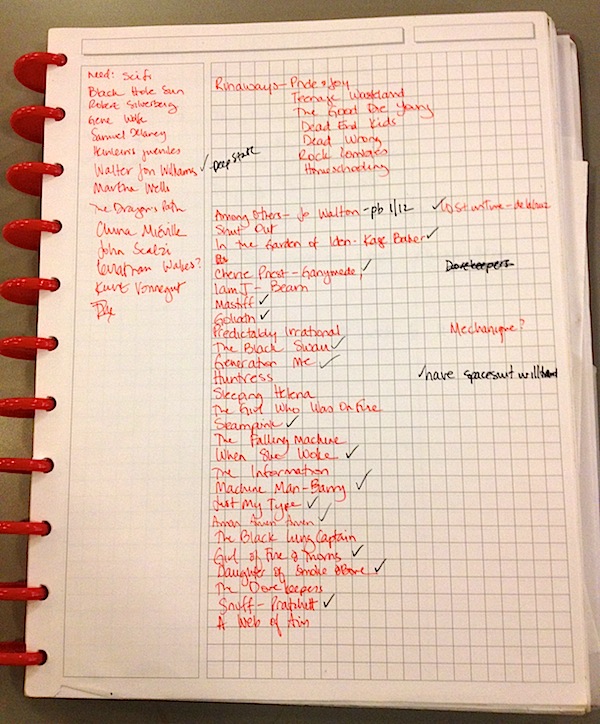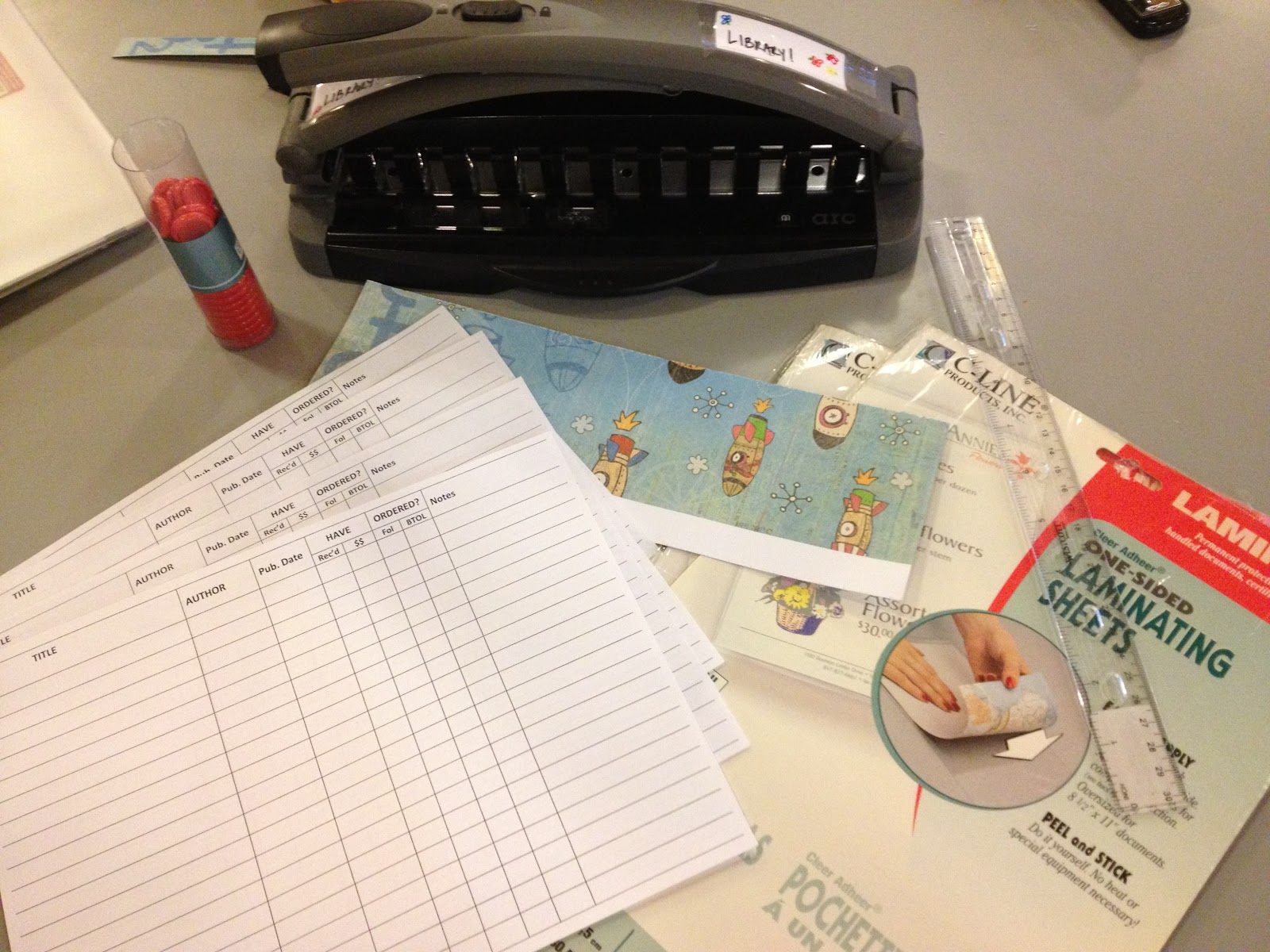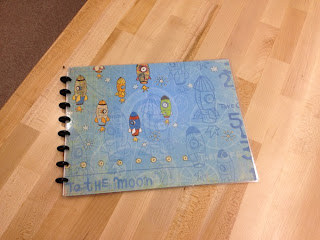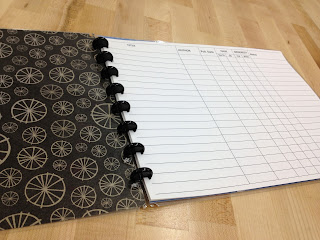Thoughts on being a "solo librarian"...
A couple of weeks back I
put out a call to solo librarians to offer some of their thoughts and
experiences. Several of you graciously offered your time and candidly answered
a short series of questions that I posed. Here, in Part I of this blog post,
are the responses! In the interest of providing for confidentiality, some name
and place references have been omitted and replaced with and ellipsis notation
[...]. In Part II, I will reflect on the essential thing that us solos—and all
school library media specialists—must do in order to maximize our time and
efforts: establishing mentorships and networking with our professional learning
communities.
A very special thanks goes
out to the solo librarians who have participated in this blog project. Your
schools are tremendously lucky to have such passionate and dedicated school
library media specialists!
Part I: HVLA Members on being Solo Librarians…
Q1: What analogy would you say describes the job you do every day?
A1: Running a never ending marathon.
A1: Is "busier than a one-legged man in an
ass kicking contest" an analogy? No? Well then, just let me
add this to my to-do list over here...
A1: One thing at a time.
Though this may sound cliché, there are so many tasks that my job entails; I
make sure to focus on one thing at time so that I may do it efficiently.
A1: Oh gosh. I don't know. I feel like I'm always
running around and juggling a million things at once (which I find exciting),
but I don't know what to compare it to...
A1: Hmm, I don’t think I have time to create an
analogy--the printer is broken and there’s a project due next period and our
Proquest logins aren’t working…. Just kidding, but that’s how I feel
day-to-day. I just came into this library in September so I don’t know if I can
form an analogy yet.
A1: Fire Chief - every day I
am presented with a large set of new tasks I
must tackle with regards to planning workshop classes, collaborating with
teachers, going over book lists, conversations with publishers, subbing,
teaching, advising clubs, arranging displays, etc. Also, as a media
specialist I am constantly on the IT end of faculty and student difficulties
with computers. Since accessibility is a key component to any successful school
library, I make myself very available to both faculty and students - in doing
so however, I feel like I am constantly putting out fires or explaining how to
do so!
Q2: To what extent (or how)
does your vision for your school library inform/affect your daily practice?
A2: One of my visions for the school library includes
giving every student the chance to pick out a book that they love based
on the genres they prefer. I make sure that I interact with every single
student at our school, to develop a relationship with them and learn what they
like and dislike in terms of books. This also helps me to better develop our
collection.
A2: My vision for the direction I
want to take our library in certainly does influence the library's day to day
rituals. In order to get books into the library, I must work on hosting bake
sales, book sales, and find other creative tactics. Our catalog is a mess and I
have been working on solving the mysteries (700 books marked as lost currently)
although some are here but have duplicate or faulty barcodes. I work to find parent volunteers and
teenage community helpers to work on shelving, cataloging, and other basic
chores. I try to schedule authors. All of these things take a lot of time and
leaving curriculum on the wayside.
A2: My vision IS my daily practice. Maybe I'm
setting my sights low, but I think the way I catalog, the way I order, the way
I shelve is all part and parcel of my vision. Most especially I think my
vision is reflected in the way I interact with my teachers and students.
In your opinion, what qualities must a person possess in order to be
successful at your job?
A2: As
a solo librarian, I feel like my vision for the library is constantly informing
my practice, which is great because I can make whatever changes or try new
things without having to ask anyone else.
A2: Since I just came here I think I am afforded a fair
amount of say-so in implementing my vision. There wasn’t a strong librarian
here for the past year so although the students needed some gentle reminders
about how they should behave in the library, so starting from scratch means I
was able to see my vision realized. Obviously there is the day to day
issues--paper running out, unnecessary chatter, etc., but because I am a solo
librarian it is my vision alone. I don’t need to shoehorn what I want into
anyone else’s ideas or adhere to previously held beliefs/designs. Therefore
what I do every day is part of my vision, because I’m creating it from scratch
in the now.
A2: I know what a great library looks like and I know
how a great library functions. The quality and quantity of resources
is always something on my mind, as is functionality and accessibility. As
a librarian, I do my best to make sure I am informed of school
curricula for every grade with regards to the collection, as well as personal knowledge on
relevant subjects so that I can be used as a ready reference resource.
Q: In
your opinion, what qualities must a person possess in order to be successful at
your job?
A3: Organized, flexible, patient,
self-motivated, creative, willing to let students work the desk, and focus
on the big picture.
A3: Independence, determination, a mule-like
stubbornness, a flair for the dramatic and a slightly neurotic need to do it
all.
A3: Flexibility, initiative, patience.
A3: In order to be successful as a school
librarian at [...High School], one must have the ability to interact with
teens and speak to them in a way that they can relate to. Since I am a solo
librarian, my job requires that I be a leader and am able to maintain the
library independently.
A3: I would probably feel this way in any other school
environment, but seeing as I am a young, petite female in a school of 900+
teenage boys, I feel like I had no choice but to be an authoritative (though
not authoritarian) personality from day one. I knew that I wouldn’t necessarily
have someone else introducing me as a person to be listened to/respected and so
I made a stand early on. I am also pretty adept at switching from several roles
throughout the day--I may be doing collection development, then scurrying away
to help a student with a computer issue, then heading back and remembering that
I have to meet with a teacher about their needs all in a matter of minutes. If
I wasn’t comfortable with being flexible in this way I would probably have a
hard time. I think that a person with a bit more tech savvy might be even
better than I am--I do find myself sending students down to the tech department
more often than a person who might have had a tech coordinator with her might
have to. However I just graduated from school in 2011, so I think my embrace of
tech as well as strong foundation in the fundamentals has me uniquely suited
for being a solo librarian, as I can be several people in one.
A3: Patience, diligence, dedication and enthusiasm
are key components to being successful as a Library Media
Specialist. Patience with both students, faculty, administration,
accounting and publishers is an invaluable virtue.
Diligence and dedication refer to the knowledge and maintenance of the
collection both on the shelves, in the computer and in your own head! Enthusiasm
is one of the most important aspects given the audience that we work with:
children and young adults. We want to get them reading and keep them
reading. If they are feeling lost either personally or academically, we
need to be a rock for them. They should never feel ill at ease for approaching
the librarian for any matter because this is why we are here. It is important
to be enthusiastic in the field and in practice to keep them comfortable and inspired
while they are in school.
Q: In what ways do you feel your previous experience, training and
schooling has informed your practice? Conversely, in what ways do you feel it
was lacking?
A4: When I was working on my Masters, I was working at
an affluent school for the gifted and felt that a lot of what we were talking
about in classes did not apply to me. Alas, I have moved on to another job and
now understand why differentiation was so important. My schooling taught me to
promote the library (which is important!) and to collaborate with teachers
(which supports the curriculum, makes meaningful connections and builds
community.)
I was not adequately
prepared to work with such a wide range of reading levels and am having trouble
finding titles that the whole group is interested in and understands. Classroom
management is a problem for me. I wish I had taken a storytelling class.
A4: School helped me understand
collection development, cataloging and made me able to whip out enough jargon
so as to confuse others when I need to. My previous job (public) helped
me understand and refine my passion for libraries, and helped me tolerate and
navigate school bureaucracy. My awesome style is all my own but my mad
public relations skills were honestly honed doing lots of retail a long time
ago (seriously, being a store manager was better experience than I ever gave it
credit for).
A4: Since I’ve always worked and went
to school at the same time, I have an ability to balance my duties well. Now
that I’m done with school, I can focus on various work-related projects at once
and get things completed.
A4: I've been working as a solo librarian for three
years, but before that I was part of a terrific team of three other librarians.
It was great to have support and be able to bounce curriculum ideas off of them
and learn from one another. However, I also really enjoy being able to create
curriculum and policies on my own. It can be overwhelming, but I really like
challenges and being busy.
A4: As I mentioned just prior, the graduate education I
had was a good preparation for solo librarianship. I completed the school
library certification via Rutgers and while I felt that many of those classes
focused more heavily on elementary and middle school students, the professors
were realistic in assessing the state of education and taught the classes under
the assumption that a librarian would be a solo. Therefore there was a focus on
how to divide time and as I said above, how to be able to accomplish the goals
of several in the body of one. On the other hand my past experience was in a
library that was much more thoroughly staffed, so one of the things I miss is
having a person with me to clarify or back up what I’m doing.
A4: My school (Queens College) gave me great ideas,
tips, and reference instruction with regards to being a librarian for Children
and Young Adults. They trained me to know what greatness is and what I should
always be reaching for with regards to my collection and myself. However
one can read about students until they are blue in the face,
but interacting with a mass amount of students one-on-one is a challenge I
never had to face prior. I don't think my school prepared me for the
special needs aspect of students with regards to differentiated instruction.
Also, it tended to focus on classes and workshops for children not YA, and
when I began my job I struggled as a librarian-teacher who teaches YA classes.
Q: What are the most important lessons you’ve learned, thus far, from
your experience as a solo librarian?
A5: Let things go and do the best I can with what I
have. Not everyone wants to collaborate and that is okay. Pick a few areas to
focus on and do them well.
A5:
As a solo librarian, I have learned that I must remain extremely
organized. Since I am running the entire library, I have to remember many
details, therefore making it imperative that I remember things such as each
students first and last name, the policies and procedures, what books have been
ordered or need to be ordered, etc.
A5: I hate cataloging. I love kids. I don't
do well with authority but I love to make people happy, so it works out.
I really like working alone while being a part of the larger school
community.
A5: I find that people/administrators
don't always realize how much it takes to teach classes, manage an entire
library, and support other teachers.
A5: I would say the most important lesson I’ve learned
so far is to trust myself--that the combination of
school/experience/personality I have has served me well and going with my gut
(since I’m the only gut) will serve me well.
A5: Often librarians are looked at as secondary to
teachers, and this is how things were for me when I began my job. As a
solo librarian I decided to do a lot of Librarian-Teacher outreach AND I
publicized my accomplishments. The more people see what it is you do, the
better. You will be utilized more, gain widespread respect, and become an
invaluable member of the faculty. The downside to this is that the library will
often become secondary, but sometimes this is what is required in a school
setting. Also, always make the effort to work with the students, they don’t
always know to go to you for help so make sure they know you are a resource to
them. Not only is it your job, but it’s good for the preservation of the
industry in ensuring the positive outlook of libraries and librarians for
future generations.
**Bonus/optional: If a library fairy godmother granted you with 3
wishes, what would you wish for?
A: An assistant, a budget that allowed me to order
books more than one time a year, and smaller classes.
A: I’d only wish for an assistant, but wouldn’t we all
A: ONE: I would wish that I didn't have to advocate
for the Library every fricking second and that everyone would understand
exactly what I do all the time. TWO: I would wish for a shiny new
facility with more (any) technology. THREE: BIGGER BUDGET!!!
A:
1. An
assistant 2. An
unlimited budget just to get the library collection up to scratch 3. An
extra hour or so in the day when I will not be disturbed so that I can just
focus on the library and NOT the whole school.
Part II: Getting
Connected and Staying Connected
Library Associations such
as HVLA, ALA and AISL all provide membership in professional learning
communities that offer support and resources for those practicing school
librarianship. Active engagement within library associations diminishes
feelings of professional isolation. A fellow HVLA member recently noted:
“HVLA
was my lifeline. Being able to share at meetings, especially when we had
divisional breakouts on subjects of interest in between the tri-annuals;
querying through the listserve; the larger meetings when they focused on
round-tables or brought in an author or professor of interest – I never felt
alone.”
Another means to
establishing a professional learning community could also be accomplished
through organizing more regionally specific groups: within a district or
borough, amongst alumni of particular MLS programs. Alternatively,
focus-specific groups may also be set up: IB librarians, Charter School librarians or librarians working in special needs schools.
Addressing the growing
trend of solo librarianship, Patti McCall, writing for the LIS jobs blog, suggests
a number of tips to keep connected professionally: Joining a library
association, pursuing professional development opportunities, keeping current
with professional literature and, most notably, finding a mentor. I think this
last piece of advice is particularly compelling. Being a self-described,
“verbal processor”, I find it extremely helpful to have someone I can simply
think out loud with or bounce ideas off of. Some of my best strategies and
ideas have come about this way. Besides getting valuable feedback on your
ideas from an experienced colleague, this really helps as it is extremely
helpful to gain affirmation for the decisions you make.
McCall rightly notes that
some organizations will formally arrange mentorships, it is also something you
can (and should) pursue on your own. Pursuing a mentor is something I wish I
had done upon assuming my current position. Though it is not too late, it sure
could have helped me during that overwhelming--and often tumultuous--first year
as a solo.
Sadly, the reality is that
systems for mentoring are not provided as often as they should in schools; this
goes not just for librarians and support staff, but for teachers, as well. It seems
the best way to establish successful mentor-mentee relationships would be for
both MLS programs and library associations to provide their students and
members with mentoring programs. While MLS programs will assign and require an
advisor for their students, this is usually done arbitrarily and without a
mentoring component.
Failing to create
opportunities that would help provide support and cultivate professional growth
is a disservice--not just to the solos among us--but to
the newbies and recent MLS grads.
It is a simple thing to
offer as it requires no budget, and little in the way of legwork; we have
members, constituencies at the ready. Moreover, it is an investment in the
future of our profession. After all, the knock-on effect is inevitable and
paying it forward would be the natural order of things considering the nature
of librarians is to want to help others.
Naturally, formally constructed mentoring set-ups
may not necessarily be as successful as those that grow organically from
consistent dialogue and recurring contact with our colleagues via membership
meetings, conferences and events. However, membership meetings--and
conferences, in particular--can tend to be infrequent and the infusion of
creative energy and camaraderie they offer is trampled by the grind of the
every-day. At the least, we can offer mentoring “set-ups” for our members who
are interested in either role.
I liken it to the blind date: things may not
work out, but there is always the chance that they could...and how wonderful it
is when they do!
By Laura Bishop, Membership Coordinator (2011-2013)











